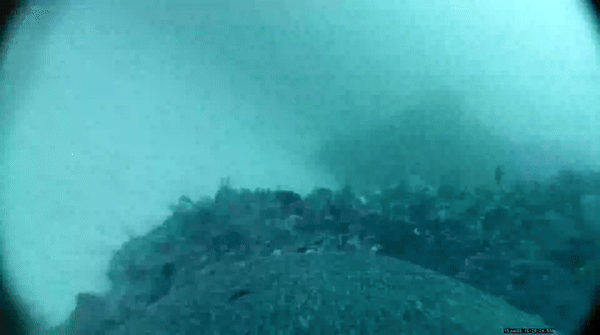New Research
Slow-Motion Ripples in Earth's Mantle Built Mysterious and Stunning Highland Landscapes, Study Finds
Following the break-up of an ancient supercontinent, waves propagated through the hot, rocky layer beneath the planet's brittle crust and reshaped its surface over millions of years
Scientists Drill Deeper Into Earth's Mantle Than Ever Before, Probing for the Origin of Life on Earth
The record-setting rock samples will provide insight into the chemical processes that may have kick-started life on our planet
Newly Deciphered, 4,000-Year-Old Cuneiform Tablets Used Lunar Eclipses to Predict Major Events
Ancient Babylonians linked astronomical phenomena to pestilence, the death of kings and the destruction of empires
Humans Could Warm Up Mars for Space Travelers by Spraying Tiny Metal Rods Into Its Atmosphere
Researchers propose a new technique for making the Red Planet more habitable by engineering heat-trapping nanoparticles from Martian dust
Fossils Shed New Light on Small 'Hobbit-Like' Humans That Lived on a Remote Island
Two teeth and a small adult arm bone found in Indonesia suggest the ancestors of Homo floresiensis were even shorter than scientists previously thought
Your Microwave Is Teeming With Bacteria, Study Suggests
Researchers found thriving communities of microbes in microwave ovens used in home kitchens, shared spaces and laboratories
Scientists Enlist the Help of Sea Lions to Reveal a Unique View of the Ocean Floor
Australian researchers glued satellite-linked GPS cameras to the animals' backs to capture footage that could be vital to marine conservation efforts
Meteorite Strikes Are the Primary Creator of the Moon's Thin Atmosphere, Study Finds
Researchers examined lunar soil samples collected during the Apollo missions to determine which weathering processes contribute most to replenishing the moon's atmosphere
Ancient Egyptians May Have Used Hydraulic Lift to Build Pyramid
Researchers propose that a system of water could have lifted heavy stones to the height necessary to construct the Step Pyramid
Swimming in Schools May Help Fish Save Energy in Turbulent Waters
A new study suggests schooling fish use up to 79 percent less energy in rough conditions than fish that swim alone
When Vultures Nearly Disappeared in India, Half a Million People Died, Too, Study Finds
By being nature's clean-up crew, the often maligned birds help prevent the spread of diseases, according to a new study
Hidden Underground Magma Pools Fueled Iceland's Volcanic Eruptions, Study Suggests
A subterranean plumbing system of magma beneath the island’s Reykjanes Peninsula may have helped set off the recent series of eruptions that could last for centuries
Static Electricity May Help Butterflies and Moths Pick Up Pollen
A new study measured the insects' electrostatic charges and used computer simulations to show that the charges were strong enough to lift pollen
Why Are Giant, Ancient Tropical Trees Dying?
Scientists from an international project are racing to figure out what kills these anchors of their ecosystems—before it's too late to save them
Early Humans Migrated Out of Africa Several Times, DNA Study Suggests
Homo sapiens interbred with Neanderthals as early as 250,000 years ago and may have ultimately bred them out of existence, according to new research
The Largest T. Rex Could Have Been 70 Percent Heavier Than Fossils Suggest
Two scientists used modeling to predict how big the giant carnivores could have really grown, making a point that fossils likely don't represent the largest or smallest individuals of a species
Ancient Mesoamerican 'Pyramid of the Moon' May Align With Summer and Winter Solstices
New research suggests the monument in Teotihuacán, along with the larger Pyramid of the Sun, were designed based on astronomical movements
Komodo Dragons Have Iron-Coated Teeth, Study Finds
New research provides the first evidence of the adaptation in a carnivorous reptile, and it might hold clues to understanding the teeth of dinosaurs
Alzheimer's Blood Test Outperforms Standard Diagnostics in New Study
The blood test accurately diagnosed Alzheimer's around 90 percent of the time, compared to 73 percent for specialists and 61 percent for primary care physicians
Two Rare Jurassic Skulls Could Help Unlock the Secrets of Mammals' Evolutionary Success
Fossils reveal a prehistoric, mouse-like creature matured slower and lived longer than similar mammals of today
Page 7 of 254
:focal(944x710:945x711)/https://tf-cmsv2-smithsonianmag-media.s3.amazonaws.com/filer_public/e9/df/e9df8a5e-adcd-496e-8432-b6f797c0039d/gettyimages-488634401.jpg)
:focal(675x450:676x451)/https://tf-cmsv2-smithsonianmag-media.s3.amazonaws.com/filer_public/e3/cc/e3cc2297-470d-4623-96c3-f29359aa5fc6/sample_of_rock_earth_under_microscope.webp)
:focal(700x527:701x528)/https://tf-cmsv2-smithsonianmag-media.s3.amazonaws.com/filer_public/a5/19/a519e50f-32d9-49ef-beb5-5595b6c4ba40/cuneiform.jpg)
:focal(320x320:321x321)/https://tf-cmsv2-smithsonianmag-media.s3.amazonaws.com/filer_public/a7/42/a742946b-581b-4795-bb7b-a2d00f2888d5/pia08636orig.jpg)
:focal(750x500:751x501)/https://tf-cmsv2-smithsonianmag-media.s3.amazonaws.com/filer_public/06/08/06083a62-fc31-46a0-a2c1-981fa9ade827/untitled_design_15.png)
:focal(640x427:641x428)/https://tf-cmsv2-smithsonianmag-media.s3.amazonaws.com/filer_public/e7/f2/e7f24549-f508-4363-aab0-6eb2aa8a96c7/kitchen-7706307_1280.jpg)

:focal(1952x1952:1953x1953)/https://tf-cmsv2-smithsonianmag-media.s3.amazonaws.com/filer_public/58/05/58052866-392d-470b-9b8a-a8bcfbb10181/as11-40-5948orig.jpg)
:focal(512x346:513x347)/https://tf-cmsv2-smithsonianmag-media.s3.amazonaws.com/filer_public/3d/32/3d3280d3-debf-4487-b94d-d88b8ae48cf8/gettyimages-2149356770.jpg)
:focal(400x267:401x268)/https://tf-cmsv2-smithsonianmag-media.s3.amazonaws.com/filer_public/8a/c2/8ac2313e-8451-4a92-9118-cbec3d3ece70/school_jacks_klein.jpeg)
:focal(3000x2000:3001x2001)/https://tf-cmsv2-smithsonianmag-media.s3.amazonaws.com/filer_public/f1/9d/f19dbd8f-ad20-496f-9665-07852d3bf051/gettyimages-1241170086.jpg)
:focal(1512x1138:1513x1139)/https://tf-cmsv2-smithsonianmag-media.s3.amazonaws.com/filer_public/21/fe/21fe87b7-82ae-415f-b634-0d46f0005c6c/gettyimages-2155900823.jpg)
:focal(3024x2016:3025x2017)/https://tf-cmsv2-smithsonianmag-media.s3.amazonaws.com/filer_public/df/cb/dfcbaa9d-9fc7-4124-a123-8173a5dce198/gettyimages-1243935899.jpg)
:focal(2464x1643:2465x1644)/https://tf-cmsv2-smithsonianmag-media.s3.amazonaws.com/filer_public/79/2b/792bd175-4567-4c8f-b685-777ca304e1ef/gettyimages-500241484.jpg)
:focal(1750x1175:1751x1176)/https://tf-cmsv2-smithsonianmag-media.s3.amazonaws.com/filer_public/97/36/973642de-8855-4633-93eb-3facdabad0ea/gettyimages-853018002.jpg)
:focal(3352x745:3353x746)/https://tf-cmsv2-smithsonianmag-media.s3.amazonaws.com/filer_public/e2/26/e2264891-48be-4dee-b8b6-6cee0f278c86/scotty_tyrannosaurus.jpg)
:focal(1217x695:1218x696)/https://tf-cmsv2-smithsonianmag-media.s3.amazonaws.com/filer_public/94/fe/94fe3973-2740-4409-adad-73d06c3c9a75/piramide_de_la_luna_072006.jpg)
:focal(2429x1619:2430x1620)/https://tf-cmsv2-smithsonianmag-media.s3.amazonaws.com/filer_public/4f/e6/4fe6bcc6-7ff9-4947-9f62-464712cff3bb/gettyimages-2123610440.jpg)
:focal(1061x707:1062x708)/https://tf-cmsv2-smithsonianmag-media.s3.amazonaws.com/filer_public/24/2f/242f7b45-9432-4e4d-9deb-1beb7c4845a9/gettyimages-1443155227.jpg)
:focal(1500x1014:1501x1015)/https://tf-cmsv2-smithsonianmag-media.s3.amazonaws.com/filer_public/6b/ce/6bce8196-1278-45c6-972f-db89449b29df/krusatodon_kirtlingtonesis_artist_impression_credit_maija_karala.jpg)